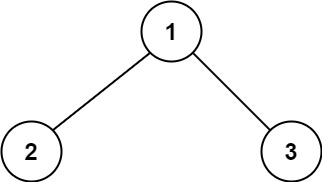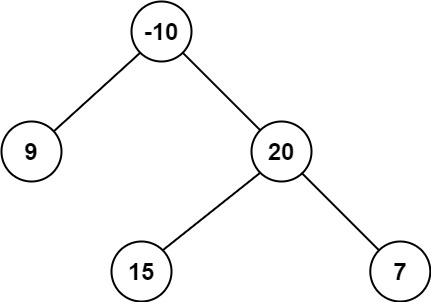LeetCode-in-All
124. Binary Tree Maximum Path Sum
Hard
A path in a binary tree is a sequence of nodes where each pair of adjacent nodes in the sequence has an edge connecting them. A node can only appear in the sequence at most once. Note that the path does not need to pass through the root.
The path sum of a path is the sum of the node’s values in the path.
Given the root of a binary tree, return the maximum path sum of any non-empty path.
Example 1:

Input: root = [1,2,3]
Output: 6
Explanation: The optimal path is 2 -> 1 -> 3 with a path sum of 2 + 1 + 3 = 6.
Example 2:

Input: root = [-10,9,20,null,null,15,7]
Output: 42
Explanation: The optimal path is 15 -> 20 -> 7 with a path sum of 15 + 20 + 7 = 42.
Constraints:
- The number of nodes in the tree is in the range
[1, 3 * 104]. -1000 <= Node.val <= 1000
Solution
using LeetCodeNet.Com_github_leetcode;
/**
* Definition for a binary tree node.
* public class TreeNode {
* public int val;
* public TreeNode left;
* public TreeNode right;
* public TreeNode(int val=0, TreeNode left=null, TreeNode right=null) {
* this.val = val;
* this.left = left;
* this.right = right;
* }
* }
*/
public class Solution {
private int max = int.MinValue;
private int Helper(TreeNode root) {
if (root == null) {
return 0;
}
// to avoid the -ve values in left side we will compare them with 0
int left = Math.Max(0, Helper(root.left));
int right = Math.Max(0, Helper(root.right));
int current = (int)(root.val + left + right);
if (current > max) {
max = current;
}
return (int)(root.val + Math.Max(left, right));
}
public int MaxPathSum(TreeNode root) {
Helper(root);
return max;
}
}

